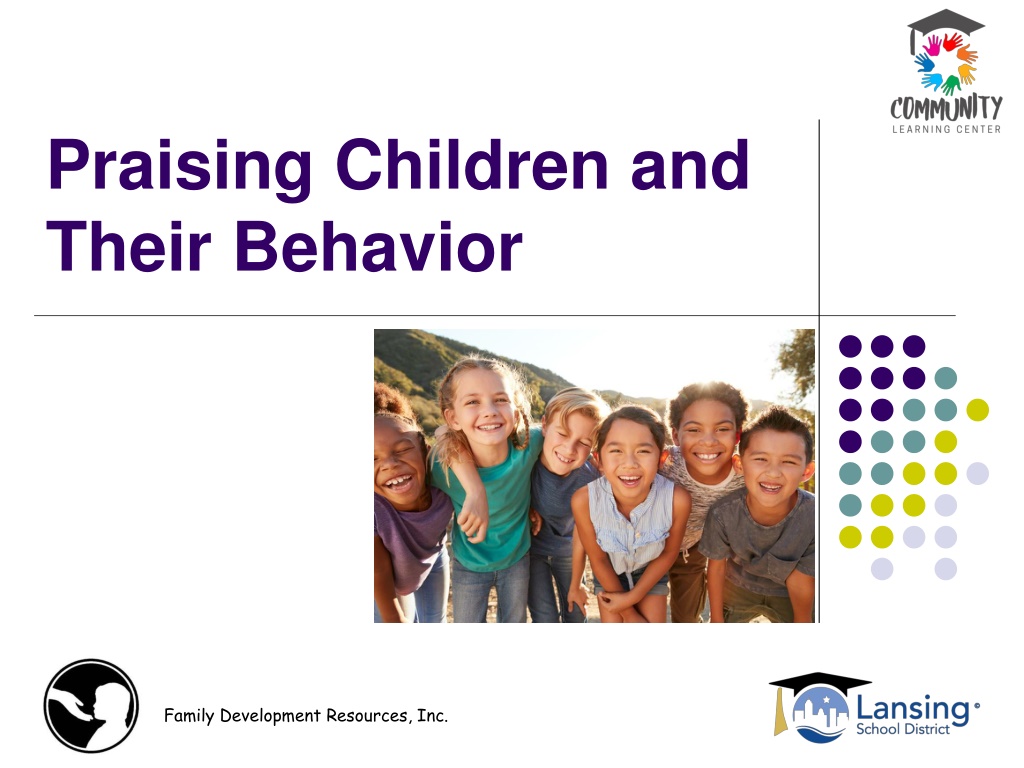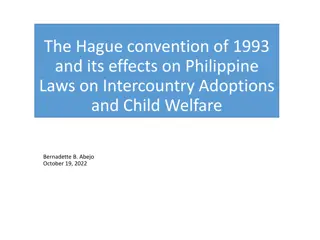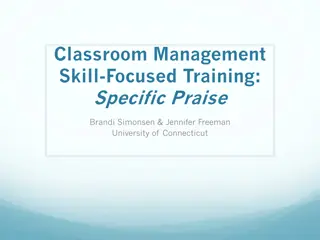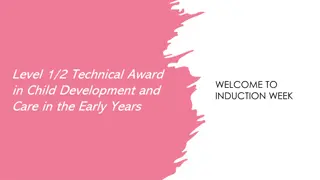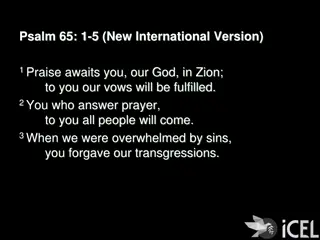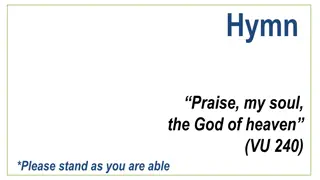Understanding the Power of Praise in Child Development
Praise plays a crucial role in promoting children’s self-esteem and overall development. By offering genuine praise for being and doing, parents can nurture a positive sense of self-worth in their children. Research shows that praised children tend to excel academically, show resilience, and lead fulfilling lives. Despite common misconceptions, praising children helps them build a strong self-concept without developing conceit. Overcoming roadblocks to using praise, such as personal discomfort or lack of experience, can empower parents to effectively utilize this powerful tool in supporting their children’s growth.
Download Presentation

Please find below an Image/Link to download the presentation.
The content on the website is provided AS IS for your information and personal use only. It may not be sold, licensed, or shared on other websites without obtaining consent from the author. Download presentation by click this link. If you encounter any issues during the download, it is possible that the publisher has removed the file from their server.
E N D
Presentation Transcript
Praising Children and Their Behavior Family Development Resources, Inc.
What is Praise? Praise can be a compliment, gesture, facial expression, or form of gentle touch like hugs or high fives that promote feelings of self pride, worth and accomplishment in others. 2
Why is Praising Children Important? Children who are praised develop a personal sense of self-worth. Praise is like fuel that powers the self-esteem of children. Research shows that children with positive self- worth get better grades, don't get discouraged easily, and generally live more productive lives. Children who sincerely believe they have worth treat themselves and others in positive ways.
Roadblocks to Using Praise There is a popular myth that if children are praised they will become conceited or believe that they are better than others. The fact is, children who are praised develop a strong sense of self and do not need to put themselves above others to feel good about themselves. They already do.
Roadblocks to Using Praise Some parents just expect their children to do what they re told to do without having to praise them. Many adults have not had the experience of receiving praise as children, so it makes it hard for them to practice the skill as parents. Adults who have difficulty accepting compliments from others may feel very uncomfortable in giving praise to their children.
Praise for Being and Praise for Doing Praise for Being is the highest form of praise anyone can receive. It tells children that they have value and worth. Praise for Being lets children know you value them for who they are. It is unconditional and given freely at any time.
Praise for Being When you praise children for Being, they don t have to do anything to earn it. Praise for Being is a powerful parenting practice for building a positive sense of self-worth in children. Some Praise for Being statements are: I really love you. You re a beautiful person. What a special child you are. I am so happy you are my son. You re a wonderful daughter.
Praise for Doing Praise for Doing lets children know you appreciate and value their efforts and behaviors. Praising a child s behavior can be for something they tried and completed, or tried but didn t quite succeed or finish. If you acknowledge your children s efforts, they are more likely to try again.
Praise for Doing Some Praise for Doing statements are: I m really pleased to see you try so hard. You buttoned all your buttons. Good for you. I m so proud of the way you cooperated. You re really doing well in school.
Using Praise Incorrectly Many parents unknowingly use praise incorrectly by using Praise for Being and Praise for Doing together. Such statements are: What a nice job cleaning your room. You really are a good girl. Daddy really loves you for cooperating with me.
Using Praise Incorrectly Such statements tell children you only love or appreciate them when they do something that pleases you. It s known as conditional love, or love that must be earned. Children quickly begin to resent such love because they know if they don t do the right thing, their parents will not love them.
Promoting Self-Praise in Children Self-praise is a way children learn the habit of praising themselves and boosting their self-image. To help a child learn self-praise, parents need to describe how good the act must have made the child feel. For example: Tracy, I bet you feel really proud of the nice job you did in cleaning your room.
Promoting Self-Praise in Children By promoting self-praise, children learn to be their own best friend and develop self-confidence. To encourage children to use self-praise, parents should model the behavior for them. 13
Being Conceited Some parents worry about their children becoming conceited because they received praise for the people they are or the things they do. Conceit is different from self-worth. When children feel conceited, they are usually sending the message that, I m better than you. Contrary to popular belief, it s children who don t have a positive self-image that wind up feeling conceited.
How to Use Praise STEP 1 Focus your attention on the child and the situation- praise deserves your undivided attention. STEP 2 Move close to the child - praise feels good when given by someone close to you. STEP 3 Make eye-contact with the child on the child s level. For example, you must bend down to be at eye level with young children.
How to Use Praise STEP 4 Gently touch the child- touch is a positive form of communication. Smile or look pleasant-everyone likes to see a happy face. STEP 5 Praise your child- for Being or for Doing. STEP 6 Offer a hug-to seal the nice words.
Accepting Praise As An Adult Praise is fuel for our positive self-worth. Self-worth is the value we have for our self: our ideas, accomplishments, successes, as well as our appearance, personality and character. When others praise any of these qualities, they are doing us a big favor-they are recognizing us in a positive way.
Why is Accepting Praise Important? It sends a message to others that we are worthy of their recognition and deserving of it. When we accept a compliment, we are building our positive self-worth. Parents with a positive sense of self-worth can help build the positive sense of self- worth in children. As models, parents show their children that accepting praise is the right thing to do. Everyone needs recognition. Accepting praise is a positive form of recognition. When we accept a compliment, we're more likely to send one.
Rejecting A Gift For a lot of adults, they ve simply forgotten how to say thank you when they receive a gift of recognition. Here are examples of how not to receive a compliment: Compliment: You look nice today. Response: Well, I feel miserable. Compliment: Nice report, John. Response: Well, if I had more time, I could ve done better.
Rejecting A Gift Clearly we would not respond in the same way if someone were trying to give us a raise. Compliment: You have been working very hard. Here is fifty dollars. Have dinner on me. Response: No, I don t deserve it. I m not that good. In fact, you probably need to decrease my salary. What happens to others who offer us a fifty-dollar compliment and we reject it? You will quit getting any compliments at all. When that happens, the fuel supply to your self- worth will be drastically cut short.
How to Accept A Compliment Look pleasant. Let the person sending the compliment see you enjoy being recognized. Say, thank you. Do not reject or send the compliment back ( Well, you look nice/work hard too. ) Be gracious and accept your gift. Use gentle touch. A touch on the arm or a handshake conveys your true appreciation. 22
